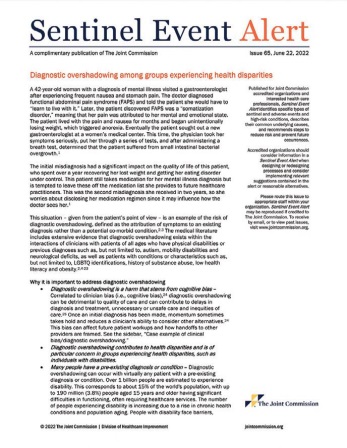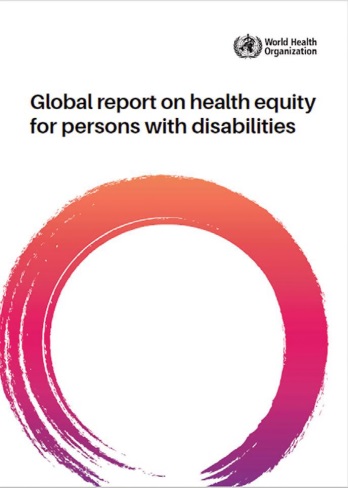SOURCE 2 : THE JOINT COMMISSION

The Joint Commission issues Sentinel Event Alert 65: Diagnostic Overshadowing Among Groups Experiencing Health Disparities.
June 2022
jointcommission.org/-/media/tjc/documents/resources/patient-safety-topics/sentinel- event/sea-65-diagnostic-overshadowing-6-16-22-final.pdf
The Joint Commission is the premier global driver of healthcare quality improvement and patient safety. They accredit organizations through an objective process that helps healthcare organizations measure, assess, and improve their performance, focusing on assisting them to deliver safe and high-quality healthcare. They issue Sentinel Event Alerts whenever a particular danger is identified that can impact health and safety. In June 2022, they issued a sentinel event alert on diagnostic overshadowing. Diagnostic overshadowing is a term used to describe a situation where a particular sign or symptom that a person is exhibiting is attributed to the person's IDD diagnosis, rather than looking for a potentially treatable underlying cause. This type of misdiagnosis can have a significant negative impact on the person. Imagine if someone who does not use words to communicate is experiencing pain from a dental abscess and can only express that pain by hitting herself on the cheek over and over. To the untrained eye, this behavior might be attributed to the intellectual disability rather than looking for an underlying cause. The person might suffer for weeks, months, or even years without ever receiving a proper diagnosis, causing significant physical and emotional trauma to the person.
SOURCE 3 : THE WORLD HEALTH ORGANIZATION

The World Health Organization (WHO) releases its Global Report on Health Equity for Persons with Disabilities
December 2022
who.int/activities/global-report-on-health-equity-for-persons-with-disabilities
The WHO estimates that 1.3 billion people experience a significant disability worldwide. This estimate includes those with IDD. Their 296-page report calls for change to the overall healthcare system to promote health equity for people with disabilities.
One of the points is that achieving health equity for people with disabilities benefits society as a whole, including older people, people who experience temporary limitations, and people living with chronic conditions.
There are calls for "transformative disability conscious medical education, training and practice," which, instead of focusing on "curing the abnormal," would present disability as one of many diversity factors around which a range of structural barriers and systemic disadvantages influence health outcomes." This comprehensive report contains numerous recommendations to achieve health equity for people with IDD.
Use these reports in your advocacy to work towards improving health equity for people with disabilities. Think of the connections you have developed with people in positions to make changes. Print these out and deliver them to clinicians you visit. Email these links to legislators and licensing boards. Call your legislators and inquire if they are aware of these reports. As the collective voice of people with IDD, advocates, self-advocates, families, and health professionals grows, it will become a driving force for change. •
ABOUT THE AUTHOR:

Dr. Craig Escudé is a board-certified Fellow of the American Academy of Family Physicians and the American Academy of Developmental Medicine and is the President of IntellectAbility (replacingrisk.com). He has more than 20 years of clinical experience providing medical care for people with IDD and complex medical and mental health conditions serving as medical director of Hudspeth Regional Center in Mississippi for most of that time. While there, he founded DETECT, the Developmental Evaluation, Training, and Educational Consultative Team of Mississippi. He is the author of Clinical Pearls in IDD Healthcare and developer of the "Curriculum in IDD Healthcare," an eLearning course used to train clinicians on the fundamentals of healthcare for people with IDD.